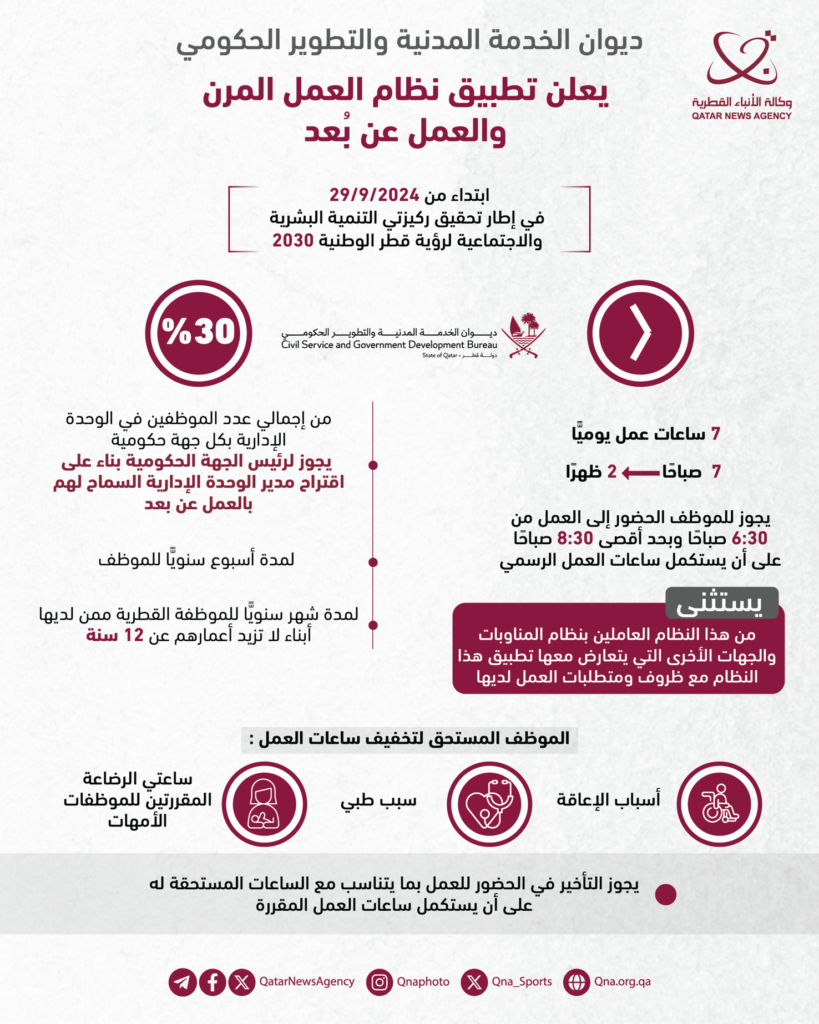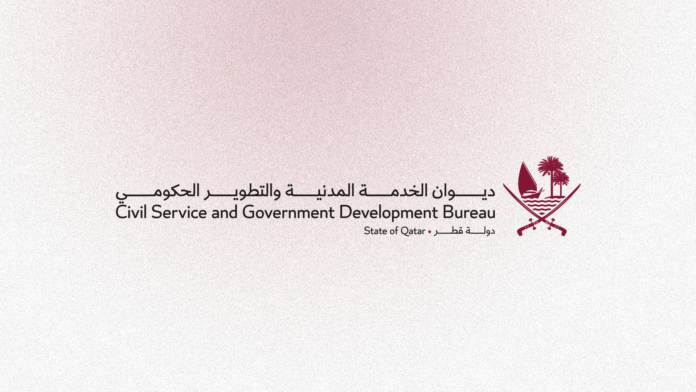On Wednesday, September 4, 2024, the Qatari Cabinet approved the flexible and remote working system for the government sector. This system, which aims to improve the work environment and provide greater flexibility for employees, will be implemented starting from September 29, 2024, according to Cabinet Decision No. 13 of 2021.
The decision is part of Qatar’s National Vision 2030 strategy, which aims to achieve sustainable development across various sectors, particularly in human and social development.
The Civil Service and Government Development Bureau announced on its X platform account that the flexible and remote work system aims to enhance innovation and flexibility in the government sector and contribute to achieving a balance between employees’ professional and personal lives.
The flexible work system will be applied to 30% of the total employees in each government entity, allowing employees to work flexible hours, provided that the required number of hours is met and that work continuity is not affected within the government entity.
According to the decision, working hours will be set from 7:00 AM to 2:00 PM, with the option to start work between 6:30 AM and 8:30 AM, depending on the employee’s needs. This system excludes shift workers and certain entities that require continuous presence, as well as other entities where applying this system conflicts with their specific work conditions and requirements.
Part-time employees must be Qatari nationals who are subject to the provisions of the Civil Human Resources Law. Not be a member of the general group of leadership positions. The employee must have successfully passed the probationary period. In addition, the employee must not work for more than one government entity in the country.
The system includes facilities for vulnerable groups. such as working mothers and people with disabilities. Qatari female employees with children under the age of 12 have the opportunity to work remotely for one month per year. while employees in general can work remotely for one week per year.
The system also allows for reduced working hours for employees with disabilities or documented medical reasons. In addition to the two lactation hours granted to female employees who are mothers.

Yaqoub Saleh Al-Ishaq, Acting Director of the Human Resources Policies Department at the Civil Service Bureau, explained the details of the part-time system during an interview with the Hayatna program on Qatar TV. The system allows for a half-hour reduction in working hours.
Al-Ishaq noted that employees can either work three and a half hours daily or two full days and half a day on the third day, with a minimum of three and a half hours per day. This means that the total weekly working hours would be 17 hours. The system stipulates that the percentage of employees benefiting from this system should not exceed 15% of the total number of employees in the government entity, with the possibility of increasing this percentage upon approval by the Cabinet.
Al-Ishaq also highlighted that priority is given to female employees, especially those with children, adding that the head of the government entity may switch the employee from part-time to full-time or vice versa upon the employee’s request.
Abdulaziz bin Nasser Al-Khalifa, the Civil Service Bureau Chairman, affirmed that the flexible and remote work system is a pivotal step towards enhancing the balance between employees’ professional and personal lives.
He explained that this system helps improve the quality of employees’ lives, boosts their productivity, and increases their satisfaction with the work environment, thereby supporting institutional excellence.
Dr. Mohammed Saif Al-Kuwari, Deputy Chairman of the National Human Rights Committee, praised this step in a statement to Al-Raya newspaper, emphasizing that it strengthens the rights of priority groups, especially working mothers and people with disabilities.
Al-Kuwari considered that this decision carries human rights and humanitarian dimensions, as it allows these groups to work with greater flexibility without affecting their professional performance or their ability to care for their families.
The role of the Civil Service and Government Development Bureau lies in achieving the highest levels of organizational and administrative development and modernization, enhancing the level of civil human resources in government entities, and elevating their performance to ensure increased efficiency, effectiveness, and optimal utilization. The Bureau is empowered to exercise all necessary authorities and responsibilities to achieve this.




